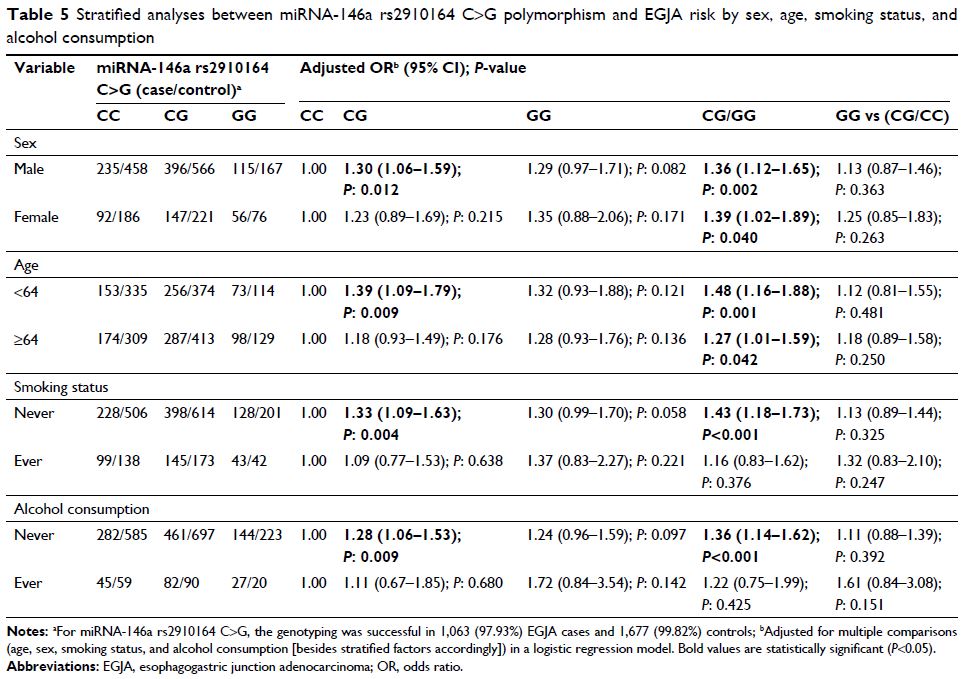108384
论文已发表
注册即可获取德孚的最新动态
IF 收录期刊
- 3.4 Breast Cancer (Dove Med Press)
- 3.2 Clin Epidemiol
- 2.6 Cancer Manag Res
- 2.9 Infect Drug Resist
- 3.7 Clin Interv Aging
- 5.1 Drug Des Dev Ther
- 3.1 Int J Chronic Obstr
- 6.6 Int J Nanomed
- 2.6 Int J Women's Health
- 2.9 Neuropsych Dis Treat
- 2.8 OncoTargets Ther
- 2.0 Patient Prefer Adher
- 2.2 Ther Clin Risk Manag
- 2.5 J Pain Res
- 3.0 Diabet Metab Synd Ob
- 3.2 Psychol Res Behav Ma
- 3.4 Nat Sci Sleep
- 1.8 Pharmgenomics Pers Med
- 2.0 Risk Manag Healthc Policy
- 4.1 J Inflamm Res
- 2.0 Int J Gen Med
- 3.4 J Hepatocell Carcinoma
- 3.0 J Asthma Allergy
- 2.2 Clin Cosmet Investig Dermatol
- 2.4 J Multidiscip Healthc

miRNA-146a rs2910164 C>G 多态性增加食管胃交界腺癌的风险:一项涵盖 2,740 名测试参与者的病例对照研究
Authors Chen Y, Tang W, Liu C, Lin J, Wang Y, Zhang S, Chen G, Zheng X
Received 20 February 2018
Accepted for publication 13 April 2018
Published 25 June 2018 Volume 2018:10 Pages 1657—1664
DOI https://doi.org/10.2147/CMAR.S165921
Checked for plagiarism Yes
Review by Single-blind
Peer reviewers approved by Dr Cristina Weinberg
Peer reviewer comments 2
Editor who approved publication: Dr Antonella D'Anneo
Purpose: The miRNA-146a rs2910164 C>G polymorphism may contribute to the
development of cancer. However, the association between this polymorphism and
the risk of esophagogastric junction adenocarcinoma (EGJA) remains unclear. In
the present study, we carried out a case–control study to explore the potential
relationship between miRNA-146a rs2910164 C>G polymorphism and EGJA risk.
Patients and
methods: In total, 1,063 EGJA patients and
1,677 cancer-free controls were enrolled. The SNPscan™ genotyping assay, a
patented technology, was used to test the genotyping of miRNA-146a rs2910164
C>G polymorphism.
Results: We found that miRNA-146a rs2910164 C>G polymorphism was
associated with a risk of developing EGJA (additive model: adjusted odds ratio
(OR), 1.27; 95% CI, 1.07–1.51; P =0.006; homozygote
model: adjusted OR, 1.31; 95% CI, 1.03–1.65; P =0.027
and dominant model: adjusted OR, 1.36; 95% CI, 1.15–1.60; P <0.001). After adjustment for
the Bonferroni correction, these associations were also found in additive and
dominant genetic models. In the subgroup analyses, after adjustment by sex,
age, alcohol consumption, and smoking status, results of multiple logistic
regression analysis indicated that miRNA-146a rs2910164 C>G polymorphism
increased the risk of EGJA in males, females, <64 years old, ≥64 years old,
never smoking, and never drinking subgroups.
Conclusion: The current study highlights that the miRNA-146a rs2910164 C>G
polymorphism increased the risk of EGJA in eastern Chinese Han population.
Keywords: miRNA-146a, polymorphism, esophagogastric junction adenocarcinoma
